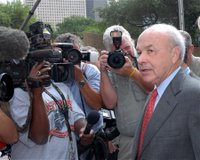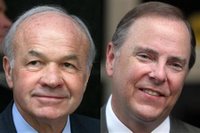About Me

- Name: Greenspan Screwed US
- Location: Pasadena, California, United States
I've long been fascinated with the credit system and the huge economic bubble created by Alan Greenspan's loose monetary policies and massive dollar printing schemes over the last 18 years as the Fed head. This massive boom will have an epic bust after Greenspan is gone, but the damage he's precipitated won't be forgotten! ------------------------- *Quotable - "I think we partially broke the back of an emerging speculation in equities... We pricked this bubble as well, I think." - Alan Greenspan, Federal Reserve Meeting, February 1994*
Links
- Google News: Greenspan
- The Market Ticker By Karl Denninger
- ZERO HEDGE - Tyler Durden
- Doug Noland
- Financial Sense
- Marc Faber
- Mortgage Fraud
- Gary Weiss
- Bob O'Brien
- The Golden Jackass
- Bill Fleckenstein
- Another Fucked Borrower
- The Mess Greenspan Made
- The Bubble Meter
- Reality Parser
- The Housing Bubble 2
- Bill Cara - Capital Markets and Social Equity
- Bush-Whacked

My blog is worth $8,752,689,031.
How much is your blog worth?
archives
- October 18, 2005
- December 15, 2005
- December 19, 2005
- December 20, 2005
- December 21, 2005
- December 22, 2005
- December 23, 2005
- December 27, 2005
- December 29, 2005
- December 31, 2005
- January 01, 2006
- January 02, 2006
- January 11, 2006
- January 15, 2006
- January 17, 2006
- January 20, 2006
- January 30, 2006
- February 01, 2006
- February 05, 2006
- March 04, 2006
- March 05, 2006
- April 12, 2006
- May 15, 2006
- May 19, 2006
- May 25, 2006
- June 01, 2006
- June 07, 2006
- June 16, 2006
- June 26, 2006
- June 30, 2006
- July 14, 2006
- July 18, 2006
- July 19, 2006
- August 03, 2006
- August 05, 2006
- August 15, 2006
- August 22, 2006
- August 23, 2006
- September 19, 2006
- September 26, 2006
- September 27, 2006
- September 28, 2006
- September 29, 2006
- October 03, 2006
- October 09, 2006
- October 16, 2006
- October 17, 2006
- October 23, 2006
- October 30, 2006
- October 31, 2006
- December 13, 2006
- December 15, 2006
- January 04, 2007
- January 17, 2007
- February 01, 2007
- February 06, 2007
- February 10, 2007
- February 14, 2007
- February 23, 2007
- February 24, 2007
- February 26, 2007
- February 27, 2007
- February 28, 2007
- March 01, 2007
- March 08, 2007
- March 12, 2007
- March 13, 2007
- March 14, 2007
- March 15, 2007
- March 16, 2007
- March 17, 2007
- March 21, 2007
- March 28, 2007
- April 04, 2007
- April 11, 2007
- April 25, 2007
- May 23, 2007
- May 24, 2007
- June 11, 2007
- June 25, 2007
- June 29, 2007
- July 20, 2007
- July 27, 2007
- August 03, 2007
- August 16, 2007
- August 17, 2007
- August 21, 2007
- August 23, 2007
- August 27, 2007
- August 30, 2007
- September 01, 2007
- September 04, 2007
- September 05, 2007
- September 06, 2007
- September 07, 2007
- September 08, 2007
- September 10, 2007
- September 18, 2007
- September 19, 2007
- September 22, 2007
- September 24, 2007
- September 27, 2007
- October 22, 2007
- October 24, 2007
- November 13, 2007
- November 30, 2007
- December 12, 2007
- December 17, 2007
- December 18, 2007
- January 15, 2008
- January 25, 2008
- February 03, 2008
- March 17, 2008
- June 14, 2008
- June 24, 2008
- August 14, 2008
- October 10, 2008
- January 06, 2009
- March 11, 2009
- March 31, 2009
- April 01, 2009
- April 27, 2009
- May 13, 2009
- June 27, 2009
- August 03, 2009
- August 18, 2009
- August 19, 2009
- November 10, 2009
- December 14, 2009
- February 09, 2010
- June 18, 2010
- July 01, 2010
- January 11, 2011
- March 04, 2011
- June 03, 2011
- August 24, 2011
- May 03, 2012
Free Counter



